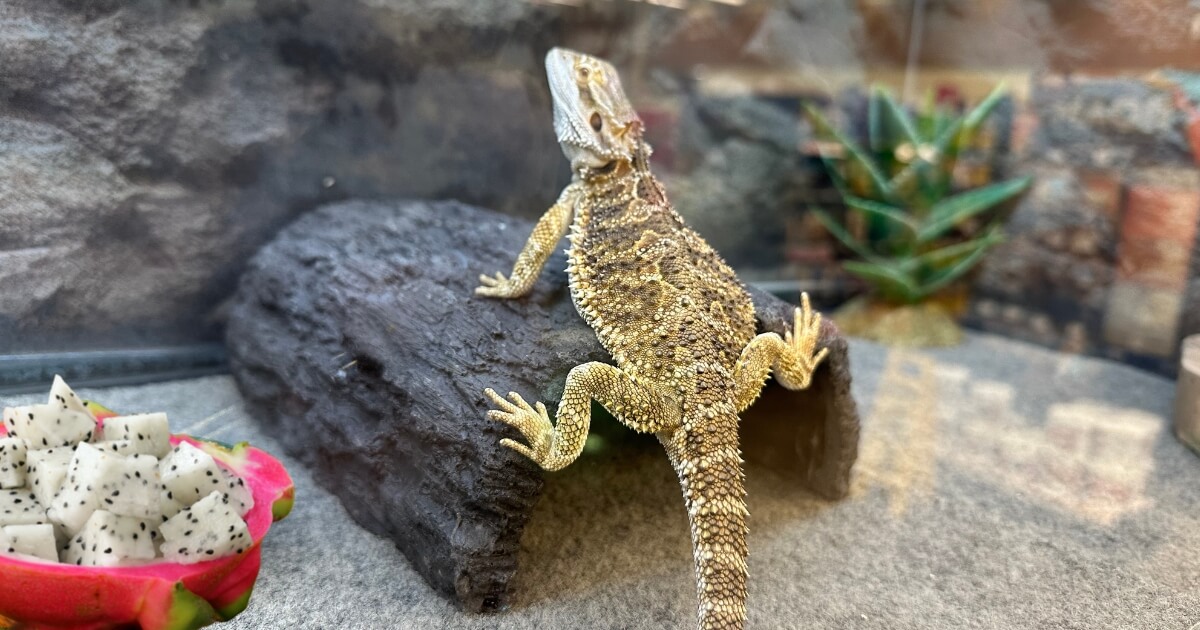
Hello, fellow reptile aficionados! It’s Mike, again with fascinating information about our beloved bearded dragons. Today, we’ll address a hot topic that’s been making the rounds in the beardie community – can bearded dragons eat dragon fruit?
Understanding your beardie’s dietary needs is essential for their health and happiness. However, the world of reptile nutrition can sometimes feel like a jungle.
That’s why I’m here, to guide you through it, one question at a time about bearded dragon food.
The Fruit in Focus: Dragon Fruit for Bearded Dragons
Famous for its vibrant pink skin and speckled interior, the dragon fruit, also known as pitaya, is an exotic fruit many humans enjoy.
But what about our scale-covered friends? Can we share this sweet treat with them?
If you are interested in fruits for bearded dragons, check my post What Fruits Can Bearded Dragons Eat?
Nutritional Profile of Dragon Fruit
To answer this question, let’s first take a look at the nutritional content of dragon fruit. It’s low in calories but packed with several vitamins and minerals, including Vitamin C, fiber, and antioxidants.
| Nutrient | Amount |
| Calories | 60 kcal |
| Protein | 1.2 g |
| Fat | 0.4 g |
| Carbohydrates | 13 g |
| Fiber | 3 g |
| Sugars | 8 g |
| Calcium | 8.8 mg |
| Iron | 0.65 mg |
| Magnesium | 10 mg |
| Phosphorus | 22.6 mg |
| Potassium | 228 mg |
| Vitamin C | 20.5 mg |
| Vitamin A | 10 IU |
| Vitamin E | 0.5 mg |
| Vitamin K | 4 mcg |
Reference: USDA National Nutrient Database
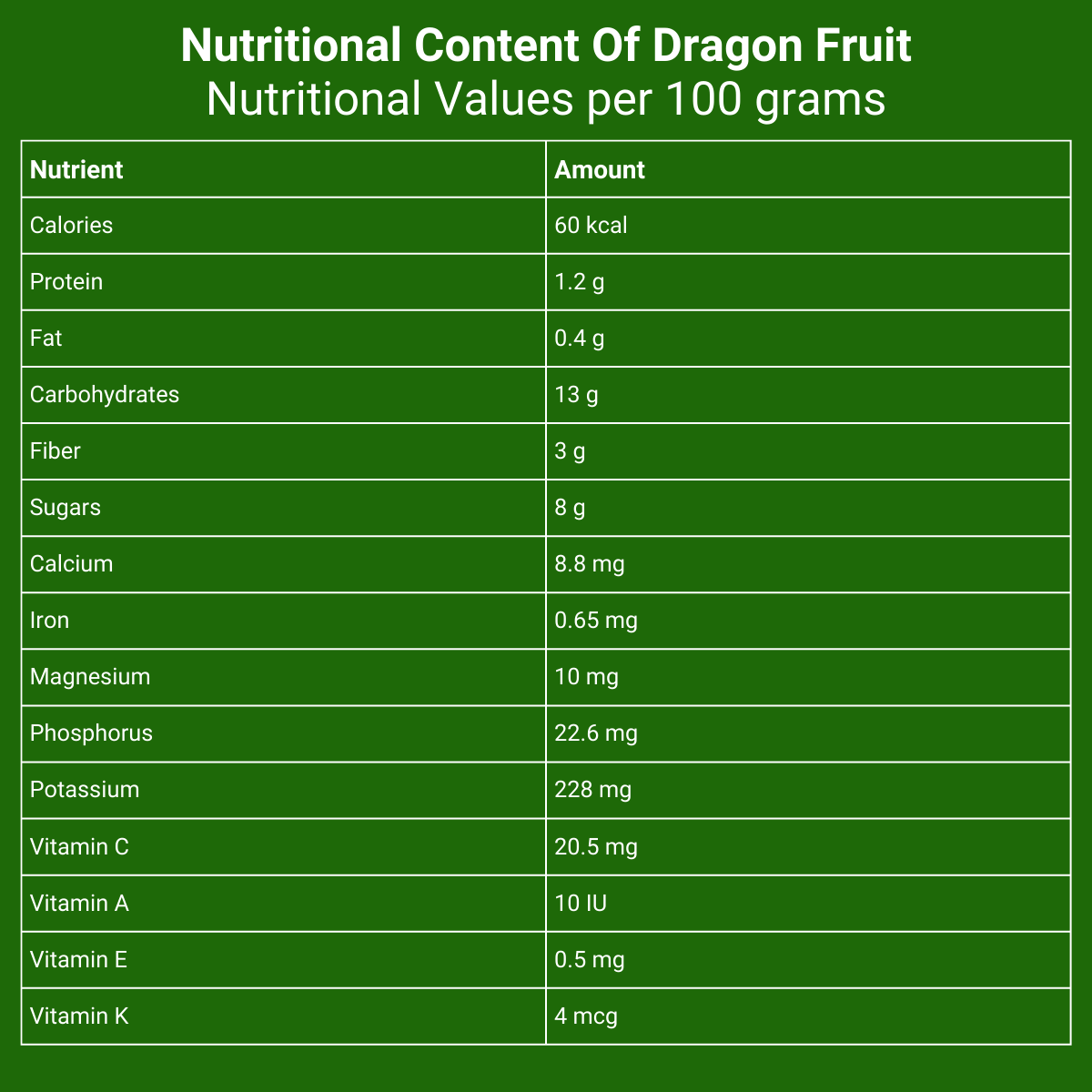
Dragon fruit is low in calories and fat, making it a good choice for bearded dragons. It also provides essential nutrients like fibre, vitamins, and minerals.
However, it’s relatively high in sugar, so it should only be fed in moderation as part of a balanced diet.
Are Dragon Fruits Healthy For Beardies?
In moderation, dragon fruit can be a healthy treat for your bearded dragon. It offers a nice change of pace and a bit of variety to their diet. The Vitamin C and fiber in dragon fruit can support your beardie’s immune system and digestive health.
However, dragon fruit should be offered sparingly because of its high sugar content.
Is It Safe For Beardies To Eat Dragon Fruit Along With Its Seeds?
Absolutely! The seeds in dragon fruit are tiny and soft, so they pose no risk to your beardie.
I remember first offering my bearded dragon, Spike, a piece of dragon fruit. I was a little worried about the seeds, but Spike ate the fruit without any trouble, seeds and all. I've since learned that the seeds are safe and do not pose a choking hazard or any other risks.
Can Beardies Eat The Skin Of Dragon Fruits?
While the skin of the dragon fruit is not toxic, it is tough and can be challenging for bearded dragons to digest. Therefore, it’s best to remove the skin and only offer the flesh to your pet.
I learned this hard when I gave Spike a small piece of dragon fruit with the skin on. He didn’t seem interested and had a hard time chewing it. From that day forward, I always peel the dragon fruit before feeding it to Spike.
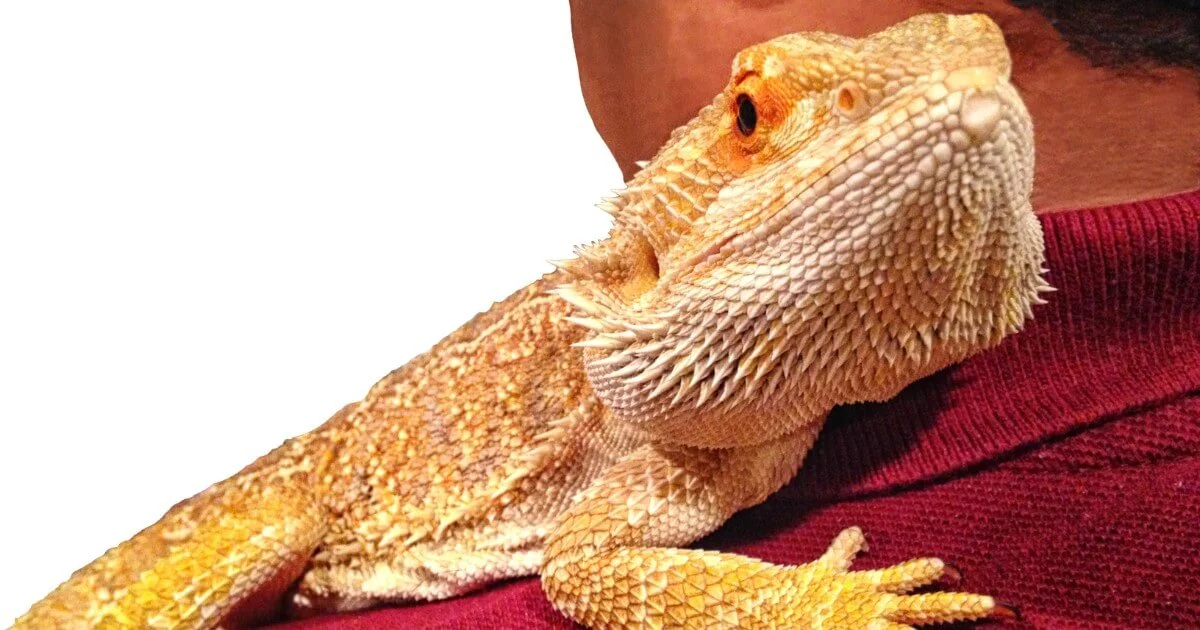
If they show any signs of discomfort or struggle to eat, it’s best to remove that item from their diet. Your vet is always the best source of advice regarding your beardie’s diet.
How to Feed Dragon Fruits to Beardies
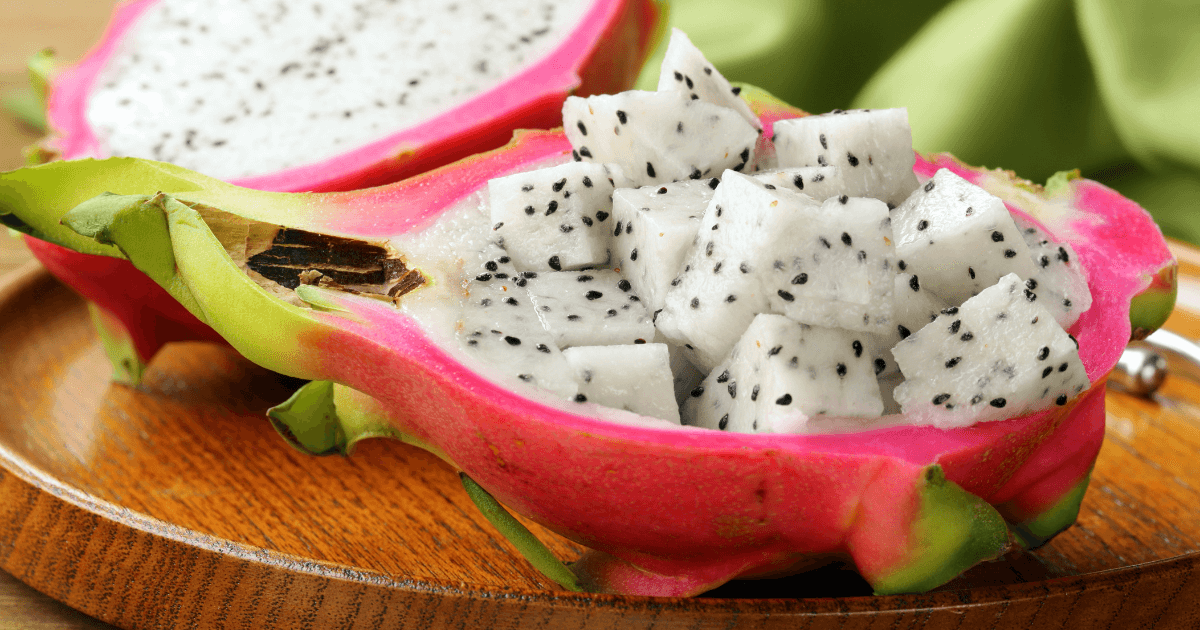
Proceed with Caution: Risks When Feeding Too Many Dragon Fruits to Beardies
This engaging video captures a bearded dragon’s reaction and delight when fed dragon fruit, providing valuable insights into feeding practices.
Overfeeding dragon fruit can lead to health issues like any other fruit. Its high sugar content can upset your beardie's stomach if eaten in large quantities.
Moreover, dragon fruit has a poor calcium-to-phosphorus ratio, which can lead to calcium deficiency and, ultimately, metabolic bone disease (MBD) in bearded dragons.
Feeding Frequency: How Often Can Bearded Dragons Eat Dragon Fruit?
Given the potential risks, it’s advisable to feed dragon fruit to your bearded dragon only once every couple of weeks and always as part of a balanced diet.
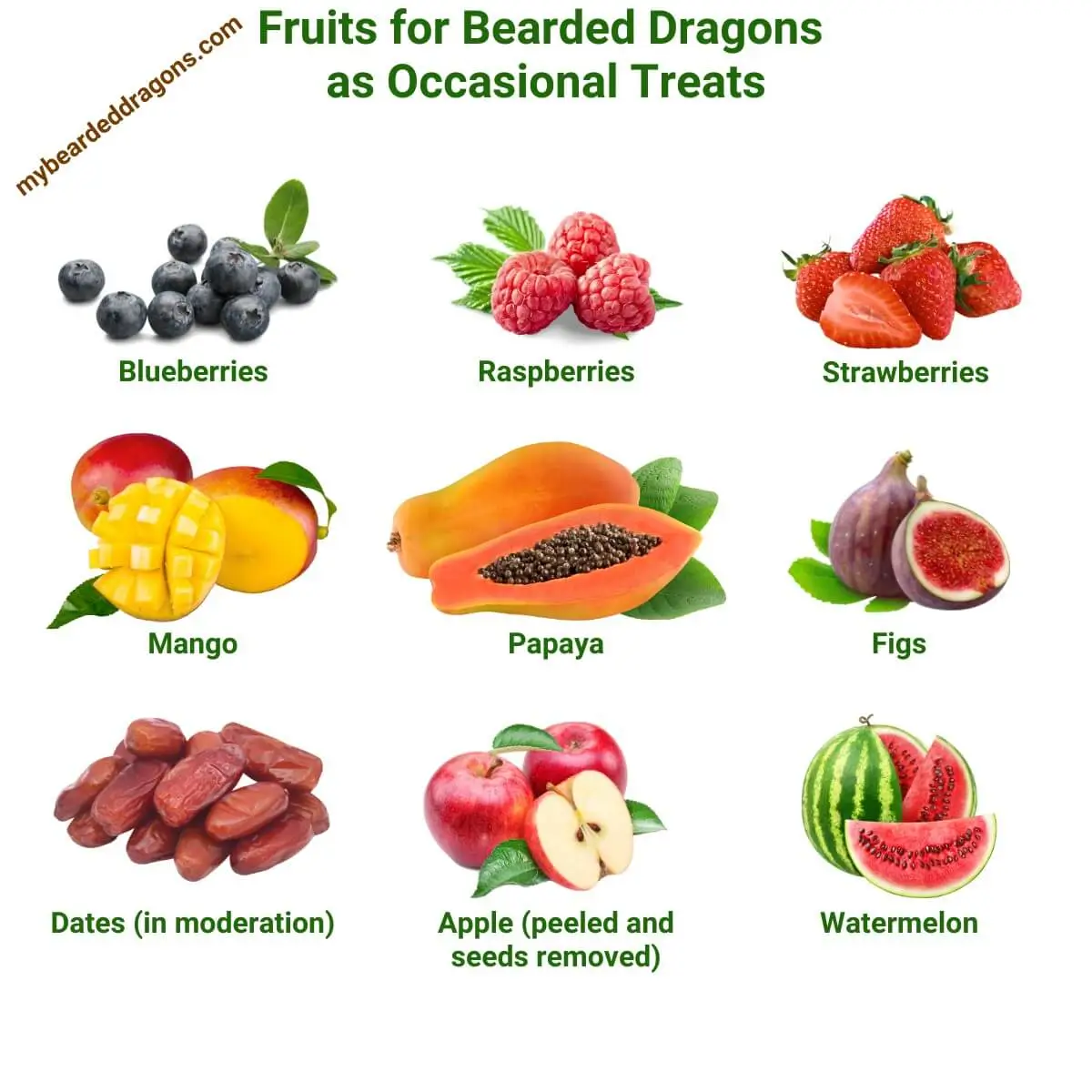
FAQs about Dragon Fruit for Bearded Dragons
Yes, bearded dragons can safely eat dragon fruit, but it should be given as a treat, not as a main part of their diet.
Yes, the seeds in dragon fruit are small and soft, so they pose no risk to bearded dragons.
While the skin is not toxic, it is tough and hard for bearded dragons to digest. It’s best to peel the fruit before feeding.
Given its high sugar content, dragon fruit should only be fed occasionally as an addition to a varied and balanced diet.
Too much dragon fruit could lead to diarrhoea due to its high water content. Also, an excess of any fruit can potentially lead to obesity and other health issues. Moderation is key.
Dragon fruit is packed with nutrients like vitamins, fibre, and minerals. However, it should only comprise a small portion of your bearded dragon’s diet.
Baby bearded dragons can eat dragon fruit, but their primary diet should be insects. It’s best to gradually introduce fruits like dragon fruit and in small amounts.
It’s best to peel the fruit and cut it into small, manageable pieces before feeding it to your bearded dragon.
Yes, bearded dragons can eat red dragon fruit. It’s similar to the white variety in terms of nutrition, but remember to feed it in moderation due to its sugar content.
Like many fruits, dragon fruit has a high phosphorus-to-calcium ratio. Too much phosphorus can interfere with calcium absorption, potentially leading to metabolic bone disease (MBD) if not balanced with calcium-rich foods. It’s important to maintain a varied diet.
Conclusion
To wrap up, bearded dragons can eat dragon fruit, but it should be offered as an occasional treat rather than a dietary staple. Moderation is key to keeping your bearded dragon healthy and happy.
Have you ever tried feeding dragon fruit to your beardie? Let’s share our experiences in the comments below! And don’t forget to share this post with other bearded dragon owners who might find it useful.





